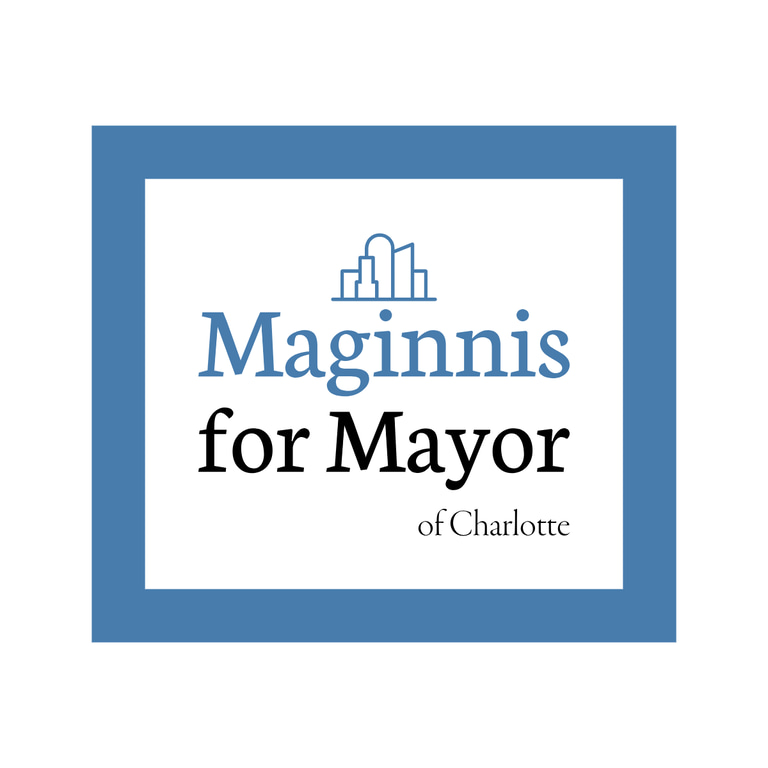Explore Our Issues
Discover detailed plans addressing critical issues from our dedicated issues page. Join us in making a difference.
Action Plan: Restoring Trust Through Transparency in Charlotte
Charlotte’s city government has faced significant challenges to public trust under Mayor Vi Lyles, with controversies like the $305,000 Johnny Jennings settlement, the $250M Racial Equity Initiative’s lack of council approval, and the $650M Bank of America Stadium renovation decision fueling skepticism about transparency and accountability.
These issues, combined with criticisms from council members Tariq Bokhari, Braxton Winston, Victoria Watlington, and Dimple Ajmera, underscore the need for reform.
As Mayor, my action plan strengthens Charlotte’s existing transparency tools, adopts innovative practices from cities like Oakland, Chicago, New York, and Seattle, and empowers our 890,000 residents to hold City Hall accountable.
Below are the detailed steps, funded by reallocating 0.67% of the $943.5M 2026 General Fund budget, to create a government that is open, responsive, and trustworthy.
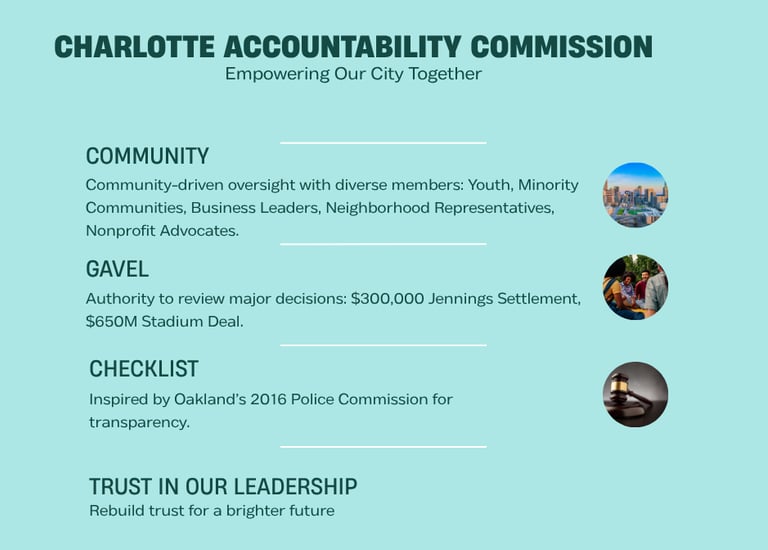

Charlotte Accountability Commission
Establishing a community-led commission with oversight of major decisions that impact the city and it's citizens
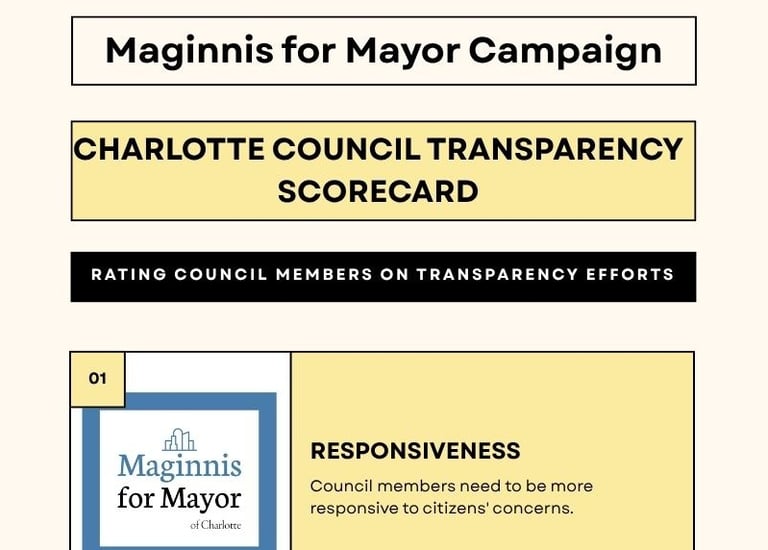

Charlotte Council Transparency Card
Holding Charlotte's elected officials accountable through transparency and metrics for engagement
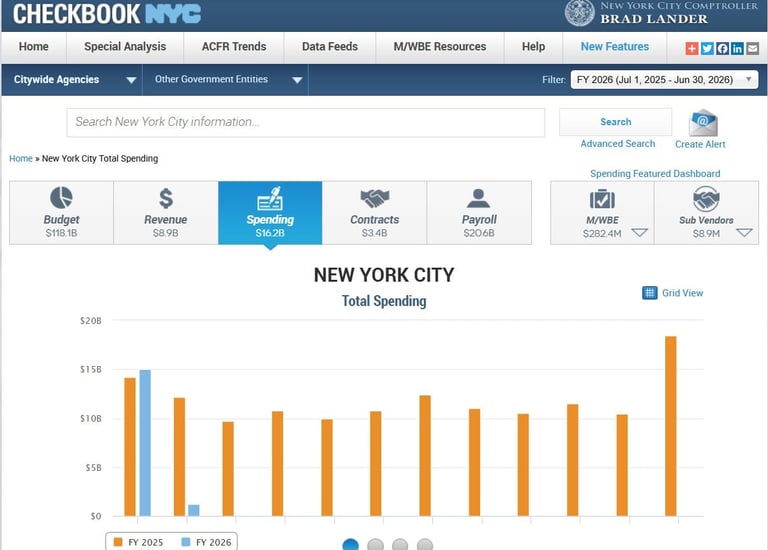

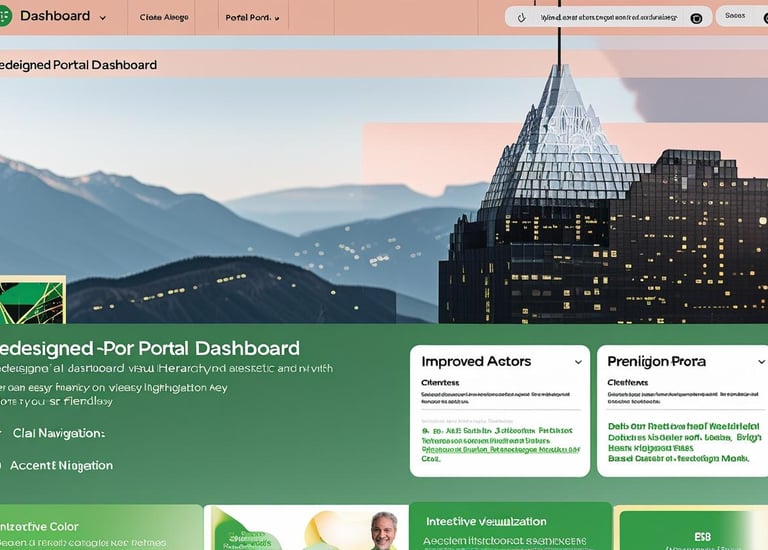

Charlotte Checkbook
Real-time view of the Charlotte budget, based off the model used in New York City, that brings power back to Charlotteans through transparency and oversight
Open Data Portal
Enhancing the current portal to make it user-friendly and a vital tool for sharing city data on budgets, public safety, and infrastructure.
Charlotte’s city government has faced significant challenges to public trust under Mayor Vi Lyles, with controversies like the $305,000 Johnny Jennings settlement, the $250M Racial Equity Initiative’s lack of council approval, and the $650M Bank of America Stadium renovation decision fueling skepticism about transparency and accountability.
These issues, combined with criticisms from council members Tariq Bokhari, Braxton Winston, Victoria Watlington, and Dimple Ajmera, underscore the need for reform.
As Mayor, my action plan strengthens Charlotte’s existing transparency tools, adopts innovative practices from cities like Oakland, Chicago, New York, and Seattle, and empowers our 890,000 residents to hold City Hall accountable.
Below are the detailed steps, funded by reallocating 0.67% of the $943.5M 2026 General Fund budget, to create a government that is open, responsive, and trustworthy.
1. Expanding Current Transparency Measures
A. Open Data Portal (ODP)
- Action: Enhance the Charlotte Open Data Portal ([data.charlottenc.gov](https://data.charlottenc.gov/)) to make city data accessible and actionable for all residents.
- Details:
- Redesign the portal with a user-friendly interface, featuring interactive visualizations like budget dashboards for the $943.5M 2026 General Fund, which includes $320M for police and $22M for housing (projected from 2023’s $784M, Charlotte Observer, 2023).
- Implement real-time or near-real-time updates for critical areas such as budget expenditures, police activity, and contract awards, including deals like the $650M stadium renovation.
- Launch a citywide public engagement campaign with workshops at community centers and libraries in underserved areas like West Charlotte, Beatties Ford Corridor, and Eastland to teach residents how to navigate the portal.
- Add a feedback mechanism for residents to suggest datasets and report usability issues, ensuring the portal evolves with community needs.
- Purpose: Addresses Watlington’s call for accountability amid a “brazen disregard for the law” (WFAE, June 2025) and ensures residents can monitor spending, countering perceptions of secrecy in decisions like the Jennings settlement.
B. Public Meeting Accessibility
- Action: Increase access to Charlotte City Council meetings to foster greater public participation.
- Details:
- Offer hybrid meeting options (in-person and virtual) with a moderated online platform for residents to submit questions or comments during sessions.
- Publish plain-language summaries of agenda items 48 hours before meetings, explaining their implications for residents, especially on controversial topics like budget allocations, zoning changes, or police policies.
- Host quarterly “Council on the Road” (COTR) meetings in diverse neighborhoods to allow direct engagement with council members, prioritizing areas like Grier Heights and NoDa.
- Purpose: Responds to Ajmera’s critique of opaque processes, such as the lack of transparency in the Danquirs Franklin case (Charlotte Observer, 2019), by making council meetings inclusive and informative.
C. Financial Transparency
- Action: Introduce initiatives to make the city’s budgeting process transparent and participatory.
- Details:
- Launch a $5M participatory budgeting pilot, allowing residents to propose and vote on community projects like parks or safety improvements, modeled after Greensboro’s program, which engaged 3,000+ voters in 2023 (Greensboro News & Record, 2023).
- Create a Budget Transparency Dashboard on the Open Data Portal, detailing how the $943.5M 2026 General Fund is spent by department, project, and neighborhood, with historical comparisons.
- Hold annual public budget workshops before budget adoption to gather resident input and answer questions about expenditures.
- Purpose: Addresses Bokhari’s concerns about misleading budget processes in the $250M Racial Equity Initiative (QC News, 2021) and ensures public involvement in financial decisions.
2. Innovative Transparency Practices
A. Charlotte Accountability Commission (CAC)
- Action: Establish an independent citizen oversight board to review major city decisions.
- Details:
- Modeled on Oakland’s 2016 Police Commission, which oversees police policies and misconduct, the CAC will include diverse members (youth, minorities, business leaders, nonprofit advocates) appointed via community nominations.
- Grant the commission subpoena power to investigate decisions like the $305,000 Jennings settlement or $650M stadium deal, with annual public reports and hearings.
- Ensure representation reflects Charlotte’s demographics, including underserved communities.
- Purpose: Directly responds to Watlington’s demand for external investigations due to a “brazen disregard for the law” in the Jennings settlement (WFAE, June 2025) and builds trust through independent oversight.
B. Charlotte Council Transparency Scorecard (CCTS)
- Action: Develop a public scorecard to evaluate council members’ transparency.
- Details:
- Partner with Sustain Charlotte to create the CCTS, inspired by Chicago’s scorecard, which addresses 38 alderman convictions since 1972, including Ald. Ed Burke’s 2022 racketeering case (Chicago Tribune, 2022).
- Rate council members on metrics like responsiveness to public inquiries, voting records on deals like the $650M stadium, campaign contribution disclosure, and participation in open forums.
- Publish annually on the city website and promote via local media (e.g., @CLTObserver, @WFAE).
- Purpose: Addresses Winston’s call for greater transparency (Charlotte Observer, 2023) and incentivizes accountability to prevent secrecy.
C. Charlotte Checkbook Platform (CC)
- Action: Launch a platform for real-time financial transparency.
- Details:
- Modeled on New York City’s Checkbook, with over 1M users annually tracking $100B+ in spending (NYC Comptroller, 2023), the CC will disclose all city contracts, vendor payments, and expenditures on the Open Data Portal.
- Include a searchable database with filters for vendor, amount, and purpose, covering deals like the $650M stadium renovation criticized for “flimsy economic justifications” (Carolina Journal, 2024).
- Purpose: Prevents secretive spending, as criticized by Bokhari (WCNC, May 2025), and ensures residents can track public funds.
D. Charlotte Community Policy Council (CCPC)
- Action: Create a council to facilitate resident-driven policy development.
- Details:
- Inspired by Seattle’s Community Involvement Commission, the CCPC will host monthly forums on issues like housing, public safety, and zoning, with residents, council members, and city staff collaborating.
- Offer virtual participation and translation services to ensure inclusivity, with public reports on outcomes.
- Purpose: Aligns with Watlington’s and Ajmera’s focus on equity and community representation, addressing distrust from decisions like the Racial Equity Initiative.
3. Implementation Timeline
- 2026:
- Q1: Launch CAC and Transparency Pledge, requiring disclosure of all lobbyist/developer meetings within 24 hours.
- Q2: Redesign ODP and launch CC platform.
- Q3: Host first CCPC forum and $5M participatory budgeting pilot.
- Q4: Publish first CCTS and hold budget workshops.
- 2027:
- Expand hybrid meeting access and COTR program to additional neighborhoods.
- Conduct a citywide trust survey through the UNC Charlotte Urban Institute to measure progress.
- 2028:
- Institutionalize transparency measures via city ordinances to ensure longevity.
4. Funding Sources for Transparency Initiatives
- Initiative: Open Data Portal (ODP)
- Estimated Cost (2026): $500,000
- % of $943.5M General Fund: 0.05%
- Funding Source: Reallocation from General Fund (Technology & Innovation budget)
- Initiative: Charlotte Accountability Commission (CAC)
- Estimated Cost (2026): $750,000
- % of $943.5M General Fund: 0.08%
- Funding Source: Reallocation from General Fund (Governance & Oversight budget)
- Initiative: Charlotte Checkbook Platform (CC)
- Estimated Cost (2026): $300,000
- % of $943.5M General Fund: 0.03%
- Funding Source: Reallocation from General Fund (Financial Transparency budget)
- Initiative: Charlotte Community Policy Council (CCPC)
- Estimated Cost (2026): $400,000
- % of $943.5M General Fund: 0.04%
- Funding Source: Reallocation from General Fund (Community Engagement budget)
- Initiative: Charlotte Council Transparency Scorecard (CCTS)
- Estimated Cost (2026): $100,000
- % of $943.5M General Fund: 0.01%
- Funding Source: Reallocation from General Fund (Accountability Programs budget)
- Initiative: Council on the Road (COTR)
- Estimated Cost (2026): $250,000
- % of $943.5M General Fund: 0.03%
- Funding Source: Reallocation from General Fund (Public Outreach budget)
- Initiative: Participatory Budgeting Pilot (PB)
- Estimated Cost (2026): $5,000,000
- % of $943.5M General Fund: 0.53%
- Funding Source: Reallocation from General Fund (Community Development budget)
- Total Cost: $6,300,000
- Total % of $943.5M General Fund: 0.67%
5. Trust Erosion Context
Public trust in Charlotte’s government has waned due to:
- Controversies: The $305,000 Jennings settlement, conducted in secret (WFAE, May 2025), the $250M Racial Equity Initiative bypassing council approval (QC News, 2021), and the $650M stadium deal, with 300 of 400 survey responses opposing it (WFAE, June 2024).
- Local Criticisms: Bokhari criticized misleading budget processes (QC News, 2021), Winston called for police transparency (Charlotte Observer, 2023), Watlington decried a “brazen disregard for the law” (WFAE, June 2025), and Ajmera noted opaque CMPD practices (Charlotte Observer, 2019). Former Mayor Jennifer Roberts highlighted the lack of competitive elections (Charlotte Observer, July 2025).
- Data: National trust in local government fell from 71% to 63% (Pew Research Center, 2007-2020), likely reflecting Charlotte’s trends, though no city-specific survey exists.
Join Our Subscription Today
Stay updated on our detailed issue plans.
Contact Us for More Info
Reach out for inquiries about our detailed plans on various issues. We're here to assist you with any questions you may have.
Support
123-456-7890
Help
info@fqexx.com
Join us in creating a better Charlotte together.
Contact
Connect
info@maginnisformayor.org
704-576-2887
© 2025. All rights reserved.
Paid for by Maginnis for Mayor of Charlotte Committee
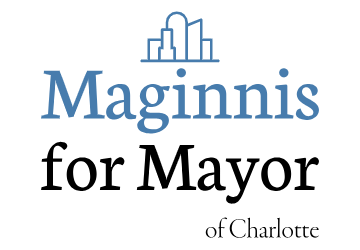

8240 Ballantyne Commons PKWY, PO 49503,
Charlotte, NC 28277
